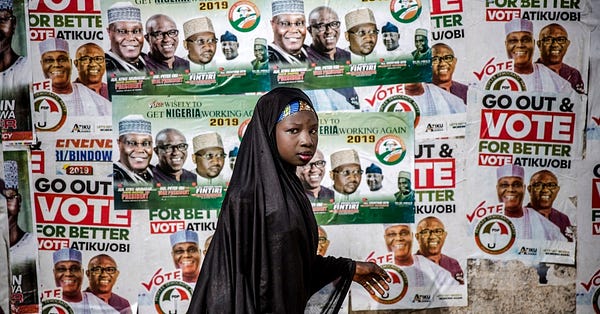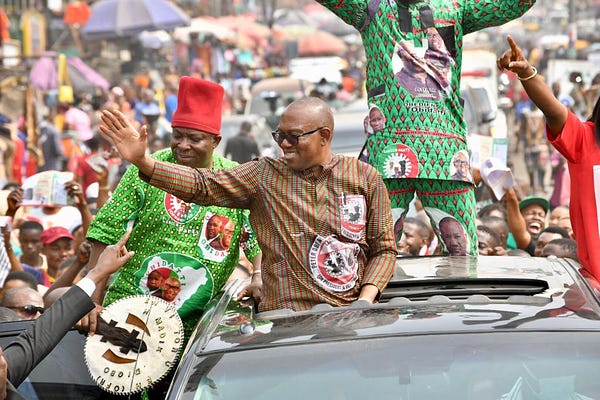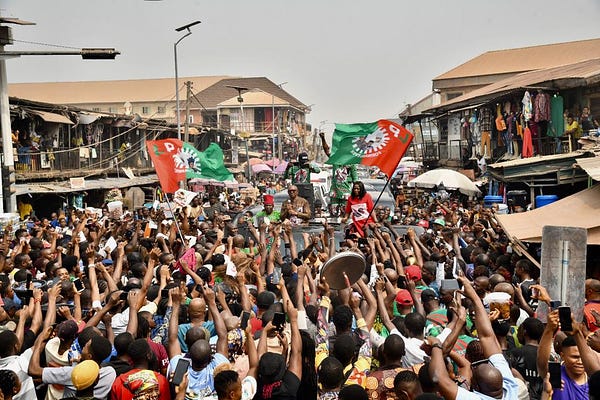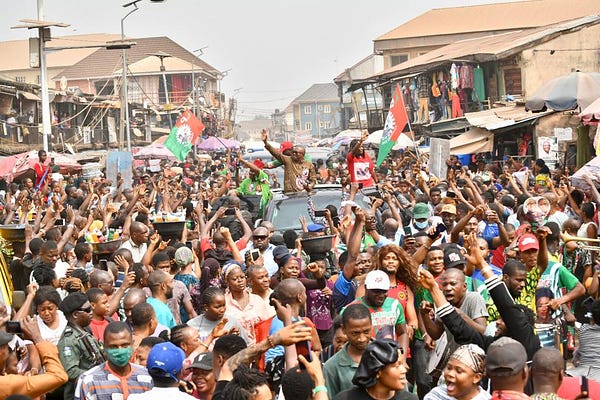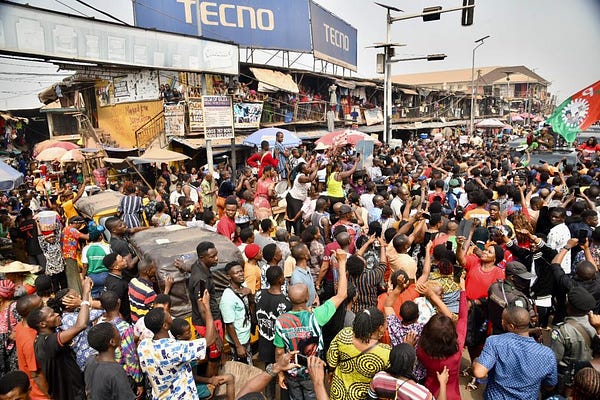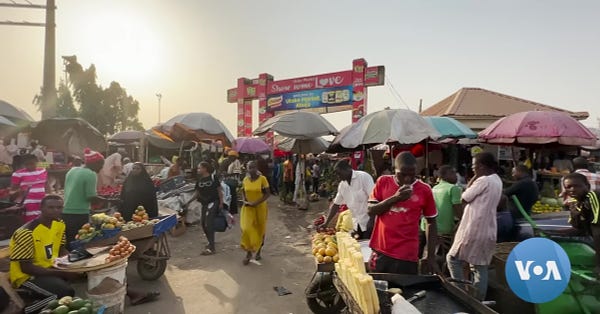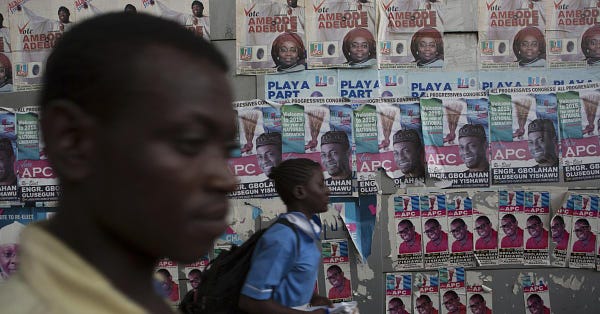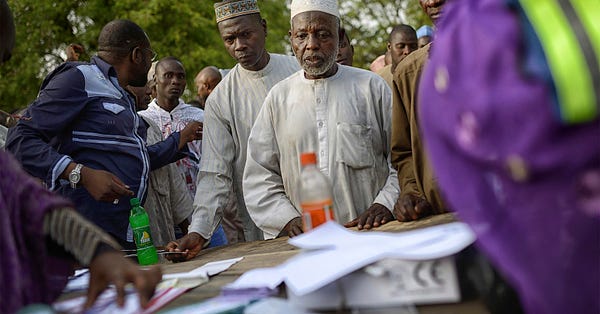Nigerians plan to go to the polls on Saturday to elect a new president in the most important election of the year. #NigeriaDecides. #NaijaDecides.
The race is coming down to the wire: Idriss Mohammed calls the race too close to call. While 18 candidates compete for president (only one woman!), it is likely a race between Bola Tinubu, Atiku Abubakar, and Peter Obi. Don’t count out the role of Rabiu Kwakanso, a former governor of Kano State who is very popular in the north. The winner will need to win the most votes nationwide and at least a quarter of the votes in at least two-thirds of Nigeria’s 36 states. If there is no clear winner, there will be a second round within three weeks.
This is a good summary of the race. Suleiman Barnabas, Paul James, Franklin Oduro, and George Ofosu provide this excellent analysis. Afolabi Adekaiyaoja writes this comprehensive report, while CSIS experts discuss how this election is different from those in the past. The Financial Times, The Republic, The BBC, NY Times, The Continent, and Al Jazeera have consistent ongoing coverage. Here are some good statistics on the electoral registrar.

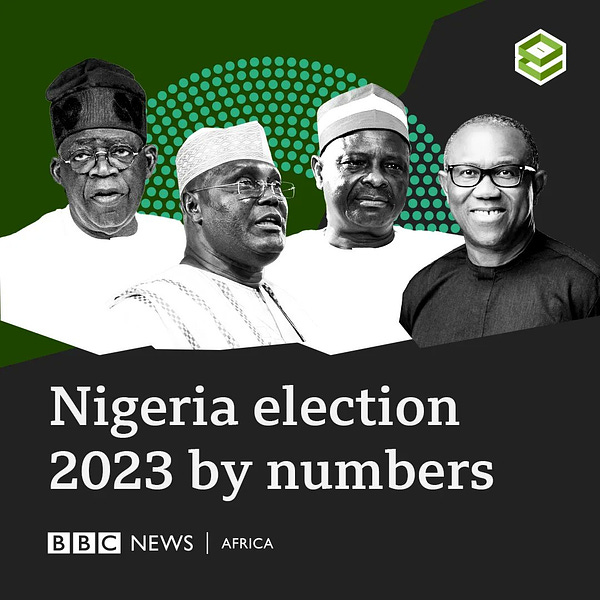
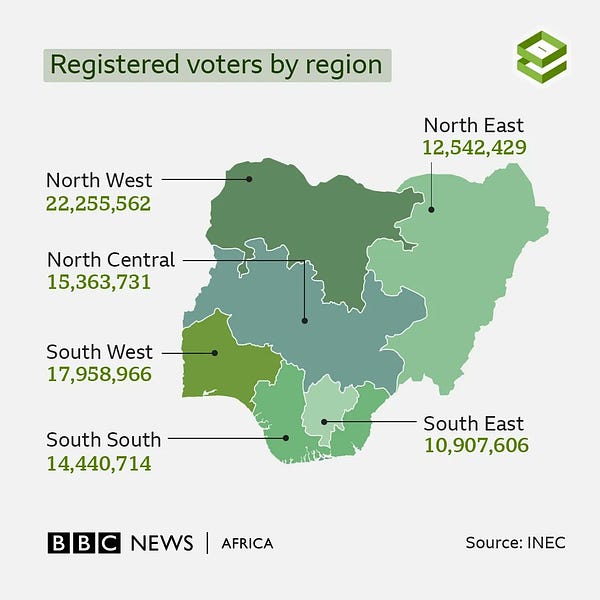
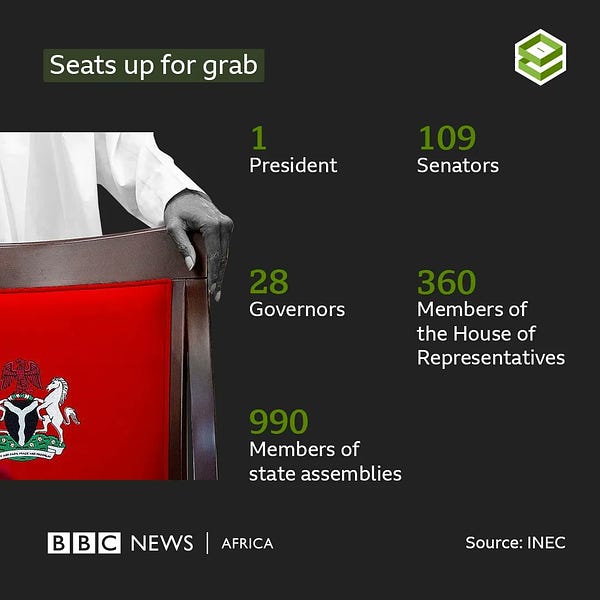
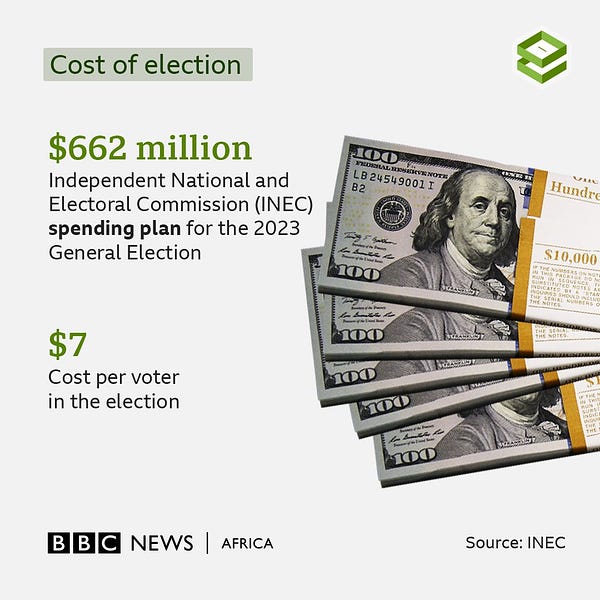
With 93 million registered voters, the election is a logistical feat. There are 176,846 polling units nationwide! The youth are poised to shape the election this time around.

Here are five things to consider in the lead-up to the polls:
1. More than a two-person race
For the first time in recent memory, this is more than a two-person race between All Progressives Congress (APC) and People’s Democratic Party (PDP) candidates. Ayodeji Rotinwa explains that this makes it the least predictable election in the nation’s history. Like Kenya’s 2022 election, voters face a new political landscape.
In the early months of the race, the governing party’s Bola Tinubu appeared inevitable to follow in Buhari’s footsteps. His unsurprising challenger with significant support in the north was the PDP’s multimillionaire businessman Atiku Abubakar, running for the fifth time at 76 years old.

Since then, Former Governor and Labour party candidate Peter Obi crashed the party. Popular with youth in the south, Obi calls for “a new Nigeria” that is accountable to its people. A recent Stears’ poll put Obi in the lead.

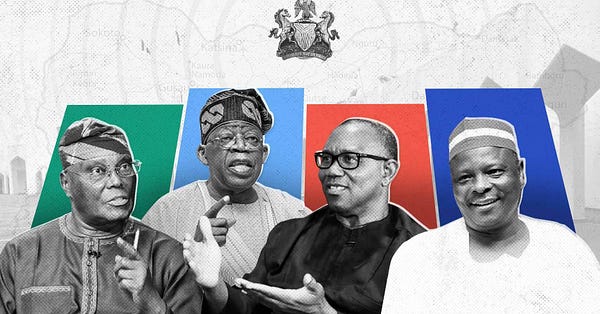
We will see whether Peter Obi’s campaign is more than “four people tweeting in a room.” The Obidients in the crowd seem to suggest that it is.
An Obi victory would be hugely significant. Ope Adetayo explains the rise of the Obidients.

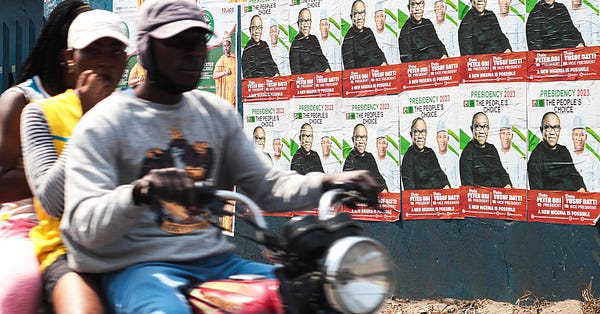
Who will emerge as Nigeria’s next president?
2. It’s the economy – and the insecurity, stupid
The elections are taking place within a challenging economic and security context, and Nigerians are demanding that candidates provide policies that will improve their lives. Nigerians are running short on cash, gas, and patience. “Everything is just tough,” a young woman explains.

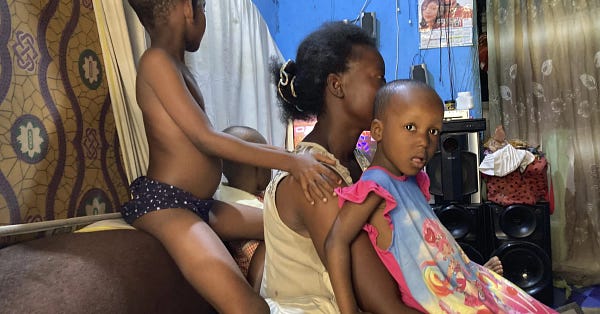
There is fear that widespread insecurity and violence will undermine the elections, and could even lead to postponing the polls. Insecurity constitutes ongoing threats to electoral integrity. The candidates explain how they plan to deal with insecurity—especially the threat of Boko Haram. But they make vague promises on security.

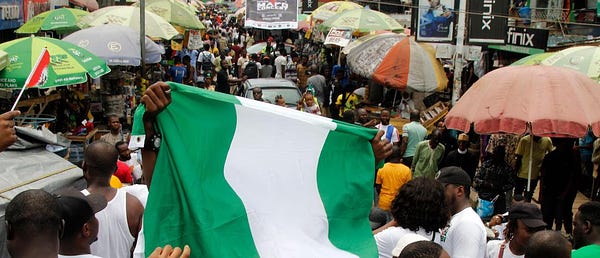
This article fact-checks claims by the candidates. Should Nigerians vote their conscience? Who are they voting for—and why?
3. The Godfathers of Nigeria
The Republic’s latest issue does an excellent job of showing the connections between governors, presidency, and the web of strategists.
“The Godfather,” or the character who “moves in silence,” holds these ties together. These political figures operate at multiple scales of government and are themselves running in gubernatorial campaigns across the country on March 11. This reporting on Lagos Governor Babajide Sanwo-Olu does an excellent job of demonstrating how godfatherism can pave a path to power, but also constrain meaningful change.
Personal politics continues to be a source of mobilization in Nigeria, and the challenge is to translate this into a national following. Bola Tinubu has long been the godfather of Lagos, building a powerful political machine that is often credited with significant economic and governance reforms.
But perhaps the real battleground is for Kano—the key to unlock the north. This is where godfather Rabiu Kwakanso could swing the election. Pay attention to how these personal networks swing the race, and check out Portia Roelofs’ forthcoming book Good Governance in Nigeria which places the voices of roadside traders and small-time market leaders alongside those of local government officials, political godfathers and technocrats to explain how politics actually works in the country.
4. Democratic deepening but disappointment with democracy
When President Buhari steps down after a new president is elected, Nigeria will have had its third consecutive peaceful transfer of power. Oil and patronage are no longer the only way to gain political power.

The country’s democracy is much freer and fairer than in the past. Yet, as Amaka Anku notes, Nigerians are much more dissatisfied with it. Listen to this group of young Nigerians discuss the state of their country. Only 21 percent are satisfied with their democracy.

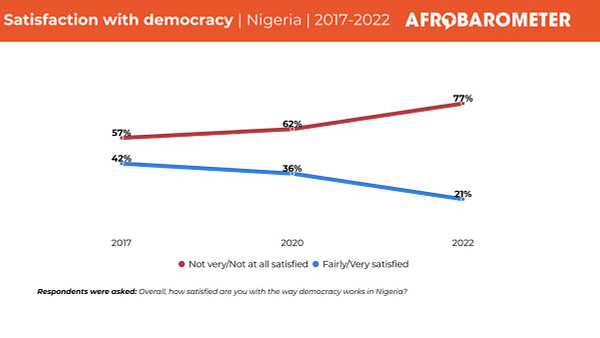
Nine in ten say the country is going in the wrong direction.

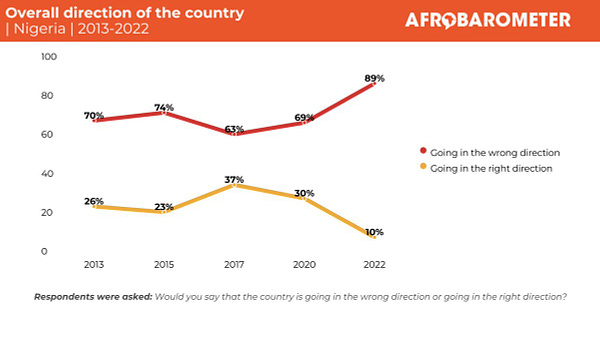
Nigerians are tired of the vote-buying and patron-client relationships.
All that said, Nigeria seems to be on autopilot, which might be Buhari’s greatest legacy. In many ways, the state of democracy in Nigeria represents the protracted state of many African democracies. Leonardo Arriola, Lise Rakner, and Nicolas van de Walle’s Democratic Resilience in Africa? provides great analysis on the state of African democracy. Ken Opalo sheds light on disconnect between demand for democracy and widespread disillusionment with elected governments: You cannot eat democracy.
5. Beyond the headlines
Coastal West Africa will shape the coming century. Nigeria will soon become the world’s third largest country. While the economy and security dominate the headlines, Nigerians are talking about other issues that matter as well. Climate change, technology, housing, and gender equality are just some of the issues on people’s minds.
Floods killed hundreds and displaced more than 1.4 million people in northern Nigeria this year, while Lagos confronts sea level rise. Olawaseun Oguntuase explains where the candidates stand on climate change. Nigerians face rising food insecurity, which candidates have addressed but there remains unclear proposed policies to confront the challenge.
Nigerian cities face an affordable housing shortage of 28 million units. Governing African cities is not easy. Lagos might be becoming Africa’s Silicon Valley (or it might not). Big Tech and African startups have the potential to reshape the country. Tech hubs are sprouting up everywhere. Government’s role in attracting investment but also limiting inequality is key. Urban governance has finally emerged as a talking point during the campaigns.
Half of Nigeria’s population are women, but only four percent were elected in the 2019 election. Sharon Adetutu Omotoso explains why women are not represented in politics. All in all, Nigerians want to be included in governing their country.




